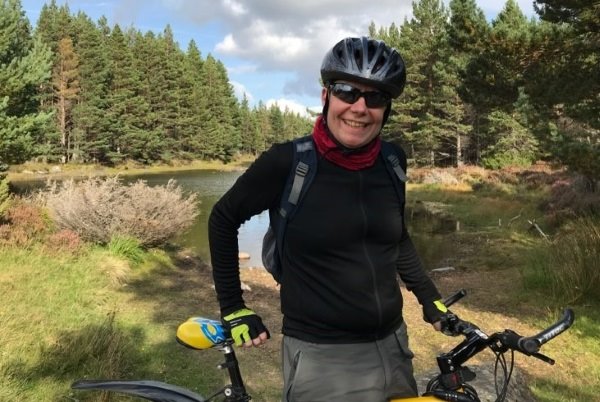This guest blog post is by Professor Jason Leitch, national clinical director for the Scottish Government
I spent a recent Saturday in the Glasgow velodrome. It was breath-taking, and some of the most exciting sport I’ve watched live for a long while. For those of you who know me, you’ll know that cycling is one of my things. I love it - from the armchair and from the saddle (although there are days when I don’t love pedalling up those Edinburgh hills…). And many of you will know that there’s a lot of cycling going on in Glasgow at the moment, mostly because Glasgow hosted the inaugural European Championships last month. The first European multi-sport event. Cycling, swimming, diving, golf, triathlon, rowing – and all so close to home. It’s brilliant.
Which is how I had the privilege of seeing the track cycling live. And on reflection, it struck me that the factors that deliver success in track cycling are remarkably similar to the factors that have driven the remarkable success of Care Opinion across the world of health and care.
How is that? I hear you ask… Well, here goes:
1. It’s all about the team
As you watch the track cycling it becomes increasingly obvious that even the so-called individual events are actually team events. Not just on the track but off it. As they get off the track, cyclists are met by a coach and handed a bottle of rehydration fluid, they are helped on and off their bikes, they have their bikes carried to the track and that’s the team you can see from the stands There are even more off-stage who work day-in and day-out with these high performing individuals.
Similarly the power of Care Opinion is in the team. It’s not just about the person telling their story about their experience and one person replying. It’s about everyone involved – the patient, their carers, their family, the team involved in the care experience that prompted the telling of the story, the people the story is shared with, the people contributing to the replies, the problem solving, and the resulting system changes. Increasingly the Scottish stories are responded to by multiple players and the strength comes from this broad approach.
2. Learning is power
The cycling teams don’t just watch themselves, they watch each other. There are some actually crazy races – the elimination race is a particularly weird example. Every two laps the last cyclist across the line is eliminated. A light flashes on their handlebars and they’re out… a bit like an adult game of musical chairs. The only way to win is to study others, to watch them and assess their energy. The key is to use just the right amount of energy and no more than you need, then on the final sprint with only two cyclists left of 30 you can win.
Now, I know you understand that Care Opinion is not a race. But to me one of the greatest strengths of Care Opinion is not just in the individual stories in ‘your’ unit or hospital but in the opportunities to read other’s experiences. All these experiences, stories, replies and system changes are an incredibly rich source of ideas and learning. The vast majority of the stories are positive and there is so much learning in these. They often point to good communication and kindness, giving encouragement and inspiration, and hopefully learning for all of us.
3. Analyse the data
You may not know this, but cycling teams are literally obsessed with data. In the centre of the track there are geeks with iPads everywhere you look. There are fancy laptops in all team areas next to tyres and lycra skin suits. They analyse everything: watts, calories, weight, fluid intake, even fluid output. All to get a small margin over their competition.
And it turns out that data is just as vital a part of Care Opinion too. When Scotland started on the Patient Opinion journey we knew there would be value in the individual stories but even the strongest advocates couldn’t have anticipated the richness of the data that is now available for learning and improvement. We can now see the count of days between challenging stories, the number of changes implemented, good vs bad story numbers and more. In fact, you can get completely lost in the data available. And as we spend more and more time understanding the data we can find usable information to help us to design and test changes at different levels of the system.
4. Transparency is crucial
There is nowhere to hide in track cycling. The centre of the track is a hive of overlapping activity. Honestly, they are tripping over each other. The bikes, the technology and the fitness regimes are clear for all to see. In fact, Team GB only upgrade their kit once a year in order to keep the latest technology secret rather than drip feed it for other teams to learn from. The other obvious element is us, the spectators, both on location and watching on TV, can see every breath of those athletes’ performance. There really is nowhere to hide.
So what happens when we join up all four of these elements? Success.
Transparency can be a bit of a fear to those who are new to Care Opinion. What if everyone is negative? What if we don’t answer well? What if ‘those in power’ use the stories against us? Scotland experienced this very same fear in the initial phases of our Patient and Care Opinion journey, and of course, with hindsight we realised we shouldn’t have been worried. It turns out that the more people who tell stories, the more positive the stories get. Members of the Scottish Parliament have now signed up to receive alerts when there are stories in their constituencies. Many of them have told me they love seeing the balance of stories they now receive, not just the good stuff, but also understanding about the more challenging elements of care and delivery.
So what happens when we join up all four of these elements? Success. That’s what happens. Success in cycling, and success for Care Opinion’s mission to be one of the key elements improving Scottish health and social care.
In 2007 a product of British Cycling’s Olympic Academy became the youngest Tour de France rider in that year’s race. He was 25. In 2018, age 36, Geraint Thomas became the third British rider to win the Tour in 6 years and made it five out of six for British Cycling. This was down to an obsession with team, learning, data and transparency.
Scotland has now been using Care Opinion for a number of years and we are starting to see real change. Team working, learning, data and transparency are all working together to create something really powerful for our health and social care service.
Reflections from the Velodrome
Reflections from the Velodrome https://careopinionuk-staging.azurewebsites.net/resources/blog-resources/4-images/164365644ade4d529c7c0c83a8df8469.jpg Care Opinion 0114 281 6256 https://www.careopinion.org.uk /content/uk/logos/co-header-logo-2020-default.pngUpdate from Care Opinion Scotland
Posted by Care Opinion, on
Thanks for your feedback.


